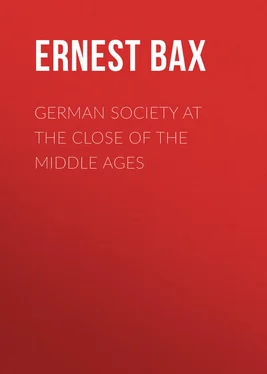Ernest Bax - German Society at the Close of the Middle Ages
Здесь есть возможность читать онлайн «Ernest Bax - German Society at the Close of the Middle Ages» — ознакомительный отрывок электронной книги совершенно бесплатно, а после прочтения отрывка купить полную версию. В некоторых случаях можно слушать аудио, скачать через торрент в формате fb2 и присутствует краткое содержание. Жанр: foreign_antique, foreign_prose, на английском языке. Описание произведения, (предисловие) а так же отзывы посетителей доступны на портале библиотеки ЛибКат.
- Название:German Society at the Close of the Middle Ages
- Автор:
- Жанр:
- Год:неизвестен
- ISBN:нет данных
- Рейтинг книги:5 / 5. Голосов: 1
-
Избранное:Добавить в избранное
- Отзывы:
-
Ваша оценка:
- 100
- 1
- 2
- 3
- 4
- 5
German Society at the Close of the Middle Ages: краткое содержание, описание и аннотация
Предлагаем к чтению аннотацию, описание, краткое содержание или предисловие (зависит от того, что написал сам автор книги «German Society at the Close of the Middle Ages»). Если вы не нашли необходимую информацию о книге — напишите в комментариях, мы постараемся отыскать её.
German Society at the Close of the Middle Ages — читать онлайн ознакомительный отрывок
Ниже представлен текст книги, разбитый по страницам. Система сохранения места последней прочитанной страницы, позволяет с удобством читать онлайн бесплатно книгу «German Society at the Close of the Middle Ages», без необходимости каждый раз заново искать на чём Вы остановились. Поставьте закладку, и сможете в любой момент перейти на страницу, на которой закончили чтение.
Интервал:
Закладка:
In the years 1491 and 1492 occurred the rising of the oppressed and plundered villeins of the Abbot of Kempten. The ecclesiastics on this domain had exhausted every possible means of injuring the unfortunate peasants, and numbers of free villeins had been converted into serfs by means of forged documents. The immediate cause of the revolt, however, was the seizure, by the abbot, of the stock of wine of a peasant who had just died, in addition to the horse which he was empowered to claim. An onslaught was made by the infuriated peasants on the monastery, and the abbot had to retire to his stronghold, the Castle of Liebenthann, hard by. The Emperor ultimately intervened, and effected a compromise. But the first organised peasant movement took place in Elsass 7 7 We adopt the German spelling of the name of the province usually known in this country as Alsace, for the reason that at the time of which this history treats it had never been French; and the French language was probably little more known there than in other parts of Germany.
in 1493, and comprised burghers as well as peasants among its numbers. They were for the most part feudatories of the Bishop of Strassburg. By devious paths the members of this secret organisation were wont to betake themselves to the hill of Hungerberg, north-west of the little town of Schlettstadt. The ostensible objects of the association were complete freedom for the common man, reformation of the Church in the sense that no priest should have more than one benefice, the introduction of a year of jubilee, in which all debts should be abolished, the extinction of all tithes, dues and other burdens, and the abolition of the spiritual courts and the territorial juridical court at Rothweil. A Judenhetze also appears amongst the articles. The leader of this movement was one Jacob Wimpfeling. The programme and plan of action was to seize the town of Schlettstadt, to plunder the monastery there, and then by forced marches to spread themselves over all Elsass, surprising one town after another.
It would seem that this was the first peasant movement that received the name of Bundschuh , and the almost superstitious importance attached to the sign of this kind emblazoned on the flag is characteristic of the Middle Ages. The banner was the result of careful deliberations, and the final decision was that as the knight was distinguished by his spurs, so the peasant rising to obtain justice for his class should take as his emblem the common shoe he was accustomed to wear, laced from the ankle up to the knee with leathern thongs. They fondly hoped that the moment this banner was displayed, all capable of fighting would flock to the standard, from the villages and smaller towns.
Just as all was prepared for the projected stroke, the Bundschuh shared the common fate of similar movements, and was betrayed; and this in spite of the terrible threats that were held out to all joining, in the event of their turning traitors. It must be admitted that there was much folly in the manner in which many persons were enrolled, and this may have led to the speedy betrayal. Everybody who was suspected of having an inkling of the movement was forced to swear allegiance to the secret league. Immediately on the betrayal, bodies of knights scoured the country, mercilessly seizing all suspected of belonging to the conspiracy, and dragging them to the nearest tribunal, where they were tortured and finally quartered alive or hung. Many of the fugitives succeeded in taking refuge in Switzerland, where they seem to have been kindly welcomed. But the Bundschuh only slept, it was by no means extinguished.
In the year 1502, nine years later, the bishopric of Speyer , the court of which was noted for its extravagance and tyranny, had to face another Bundschuh . This second movement had able men at its head, and extended over well nigh all the regions of the Upper and Middle Rhine. It similarly took the nature of a conspiracy, rather than of an open rebellion. Within a few weeks, 7000 men and 400 women had been sworn into the league, from a large number of villages, hamlets and small towns, for the larger towns were purposely left out, the movement being essentially a peasant one. The village and mark of Untergrünbach was its centre. Its object and aim was nothing less than the complete overthrow of the existing ecclesiastical and feudal organisation of the Empire. The articles of the association declared: "We have joined ourselves together in order that we may be free. We will free ourselves with arms in our hands, for we would be as the Swiss. We will root out and abolish all authorities and lordships from the land, and march against them with the force of our host and with well-armed hand under our banner. And all who do not honour and acknowledge us shall be killed. The princes and nobles broken and done with, we will storm the clergy in their foundations and abbeys. We will overpower them, and hunt out and kill all priests and monks together." The property of the clergy and the nobles was to be seized and divided; as in the former case, all feudal dues were to be abolished, the primitive communism in the use of the land, and of what was on it, was to be resumed. The pass-word, by means of which the members of the organisation were known to one another, was the answer to the question:
"How fares it?" The question and answer were in the form of a rhyme: —
"Loset! Was ist nun für ein Wesen?"
"Wir mögen vor Pfaffen und Adel nit genesen."
This may be paraphrased as follows: —
"Well, now! And how doth it fare?"
"Of priests and of nobles we've enough and to spare."
The idea was to rise at the opportune moment, as the Swiss had done, to free themselves of all intermediate lordship, and to recognise no master below the King of the Romans and the Emperor. "Nought but the justice of God" was the motto of their flag, and their colours were white and blue. Before the figure of a crucifix a peasant knelt, and below was depicted a great Bundschuh , the sign which had now become established as the symbol of the peasants' movements. With consummate tact, the leaders of the revolt forbade any members to go to confession, and it was the disregard of this order that led to the betrayal of the cause. A peasant in confession revealed the secret to a priest, who in his turn revealed it to the authorities. Ecclesiastics, princes, and nobles at once took their measures. The most barbarous persecution and punishment of all suspected of having been engaged in the Bundschuh conspiracy followed. Those concerned had their property confiscated, their wives and children were driven from the country, and they themselves were in many cases quartered alive; the more prominent men, by a refinement of cruelty, being dragged to the place of execution tied to a horse's tail. A tremendous panic seized all the privileged classes, from the Emperor to the knight. They earnestly discussed the situation in no less than three separate assemblies of the estates. Large numbers of those involved in this second Bundschuh managed to escape, owing to the pluck and loyalty of the peasants. A few bands were hastily got together, and, although quite insufficient to effect a successful revolt, they were able to keep the knightly warriors and landesknechte at bay at certain critical points, so as to give the men who had really been the life and intelligence of the movement time to escape into Switzerland or into other territories where they were unknown. In some cases the secret was so well kept that the local organisers remained unnoticed even in their own villages.
For ten years after the collapse of the second Bundschuh in the Rhenish district, the peasants remained quiet. It was not till 1512 that things began again to stir. One of the leaders, who had escaped notice on the suppression of the former conspiracy, was Joss Fritz. He was himself a native of Untergrünbach, which had been its seat. He there acted as Bannwart or ranger of the district lands. For nearly ten years Joss wandered about from country to country, but amid all his struggles for existence he never forgot the Bundschuh . Joss was a handsome man, of taking and even superior manners. He was very careful in his dress, sometimes apparelling himself in black jerkin with white hose, sometimes in red with yellow hose, sometimes in drab with green hose. He would seem to have been at one time a landesknecht , and had certainly taken part in various campaigns in a military capacity. Whether it was from his martial bearing or the engaging nature of his personality, it is evident that Joss Fritz was in his way a born leader of men. About 1512 Joss settled down in a village called Lehen, a few miles from the town of Freiburg, in Breisgau. Here he again obtained the position of Bannwart , and here he began to seriously gather together the scattered threads of the old movement, and to collect recruits. He went to work cautiously; first of all confining himself to general complaints of the degeneracy of the times in the village tavern, or before the doors of the cottagers on summer evenings. He soon became the centre of an admiring group of swains, who looked up to him as the much-travelled man of the world, who eagerly sought his conversation, and who followed his counsel in their personal affairs.
Читать дальшеИнтервал:
Закладка:
Похожие книги на «German Society at the Close of the Middle Ages»
Представляем Вашему вниманию похожие книги на «German Society at the Close of the Middle Ages» списком для выбора. Мы отобрали схожую по названию и смыслу литературу в надежде предоставить читателям больше вариантов отыскать новые, интересные, ещё непрочитанные произведения.
Обсуждение, отзывы о книге «German Society at the Close of the Middle Ages» и просто собственные мнения читателей. Оставьте ваши комментарии, напишите, что Вы думаете о произведении, его смысле или главных героях. Укажите что конкретно понравилось, а что нет, и почему Вы так считаете.










